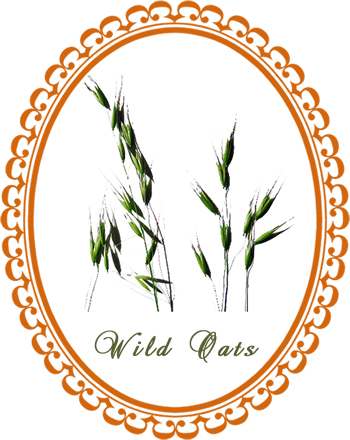
Wild Oats: rich in vitamin E, minerals and protein, wild oats are a food tonic for the heart, nerves and thymus gland ...
Common Names: Oats, Groats, Avoine (French), Hafer (German), Avena (Italian and Spanish)
Botanical Name: Avena sativa
Botanical: Graminaceae
Plant Type: Annual
Parts Used: Seeds and stems
A tall annual cereal, widely grown as a fodder in temperate and sub-tropical countries, also does well in the high-altitude tropics. Oats are only known as a cultigen, of uncertain origin, but were known to Lake Dwellers of Europe. It is now cultivated throughout the temperate zones of the Old and New Worlds as a summer crop and in the sub-tropics as a cool-season crop (mainly as forage); they are also a good forage in the high altitude tropics. Oats are believed to be derived chiefly from two species, wild oat (A. fatua L.) and wild red oat (A. sterilis L.).
Description: Avena sativa, or the common oat, has a smooth stem, from 2 to 4 feet high, with linear-lanceolate, veined, rough leaves, with loose, striate sheaths; the stipules are lacerate; the panicle equal and loose; the stalk, pendulous, 2-flowered, both flowers being perfect, the lower one mostly awned; the bracts are somewhat cartilaginous, closely embracing the seed; the root is fibrous and annual.
Cultivation: Oats are sown in the spring or early summer, as soon as the soil can be worked. An early start is crucial to good yields as oats will go dormant during the summer heat. In warmer areas, oats are sown in late summer or early fall. Oats are cold-tolerant and will be unaffected by late frosts or snow.
Culinary Uses: Oats are a cereal grain that is grown for its seed. Most people have this cereal at least on an occasional basis. They are eaten by humans and livestock of all kinds. People eat them as 'oatmeal', in bread or as cereal. They are also known as groats. Oats are used in baking, either alone or mixed with other grains.

Herbal Healing with Wild Oats
Medicinal Uses: The whole plant is used at the green stage (called "oat herb") as a restorative treatment for an exhausted nervous system. For anyone who is run-down, anxious, over-extended, or suffering from the effects of stress, Avena offfers a supportive boost. It also relieves insomnia, estrogen deficiency, depression, persistent colds, and fatigue. It is a supportive herb for withdrawal from nicotine. Avena is a part of the Ayurvedic treatment for opium addiction. The juice of the green oats cleanses the system of uric acid, which can cause gout. When oats are combined with scullcap or mugwort, it is effective against depression. Oat straw, combined with nettle, red raspberry leaf and alfalfa make a very nutritious herbal tea during the last trimester of pregnancy.
The ripe plant (called "oat straw") is useful for the skin, hair and nails. Used on the skin, Avena poultice is soothing and healing for any form of inflammation, it is used for the treatment of skin conditions like eczema, chicken pox, dry itchy patches and insect bites. Handfuls of oatmeal may be added to a warm bath, making this a very useful first-aid treatment for a child in acute distress. You can add the herb to your bath or get commercial soaps, gels and other bathing accessories.
The herb can be taken as an infusion, a tincture or a bath.
For an infusion, add 1 to 3 teaspoons of straw in 1 cup of boiling water and steep for 10 to 15 minutes. This infusion can be taken three times per day.
3 to 5 ml of tincture can be taken 3 times per day.
For a bath that is soothing for skin conditions and neuralgia, boil 1 pound of shredded straw in 2 quarts of water. Let steep for half an hour. Strain and add the liquid to your bath. Alternatively, cooked rolled oats can be put into a muslin bag and placed in the bath.
Body Care with Avena (Wild Oats)
- To restore an exhausted nervous system, drink 1 cup wild oat decoction as needed during the day.
- To soothe dry, itchy skin, such as eczema, take an oat straw bath and drink 1 cup wild oat decoction three times daily.
Decoction: Boil 1 teaspoon dried or 2 teaspoons fresh oat herb in 1 1/2 cups water for 5 - 10 minutes. Strain, then drink immediately.
Oat Straw bath: Simmer 100g (3 1/2 oz) chopped oat straw in 3 litres (12 cups) water for 20 minutes. Strain. Add the mixture to your bath water.
If you appreciate the information provided,
please help keep this website running. Blessings!
© 2008-2025 aromaworx.ca. All rights reserved.

